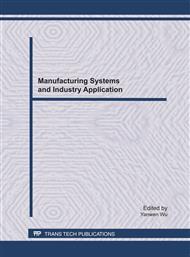[1]
Foner, L N. 1996. A Security Architecture for Multi-Agent Matchmaking. In: Proceeding of The Second International Conference on Multi-Agent Systems (ICMAS'96). Keihanna Plaza, Kansai Science City, Japan.
Google Scholar
[2]
Resnick, P., and Varian, H. R. (1997). Recommender Systems. Special issue of Communications of the ACM. 40(3).
Google Scholar
[3]
R. Cissée. An Architecture for Agent-Based Privacy-Preserving Information Filtering. Sixth International Workshop on Trust, Privacy, Deception and Fraud in Agent Systems, (2003).
Google Scholar
[4]
Herlocker, J. (2000). Understanding and Improving Automated Collaborative Filtering Systems. Ph.D. Thesis, Computer Science Dept., University of Minnesota.
Google Scholar
[5]
S. Maneeroj, H. Kanai, K. Hakozaki, Combining Dynamic Agents and Collaborative Filtering without Sparsity Rating Problem for Better Recommendation Quality, Proceedings of the Second DELOS Network of Excellence Workshop, 2001, pp.33-38.
Google Scholar
[6]
Huang qin-hua, Ouyang wei-min, Fuzzy collaborative filtering with multiple agents, Journal of Shanghai University (English Edition), 2007, 11(3): 290-295.
DOI: 10.1007/s11741-007-0321-2
Google Scholar
[7]
Manos Papagelis, Dimitris Plexousakis, Qualitative analysis of user-based and item-based prediction algorithms for recommendation agents, Engineering Application of Artificial Intelligence 18 (2005) 781-789.
DOI: 10.1016/j.engappai.2005.06.010
Google Scholar
[8]
Foner, L N. 1997. Yenta: A Multi-Agent, Referral-Based Matchmaking System. In: Proceedings of The First International Conference on Autonomous Agents (Agents'97), 301-307. ACM Press.
DOI: 10.1145/267658.267732
Google Scholar
[9]
Schafer, J. B., Konstan, J., and Riedl, J. (1999). Recommender Systems in E-Commerce. In Proceedings of ACM E-Commerce 1999 conference.
DOI: 10.1145/336992.337035
Google Scholar
[10]
Sarwar, B. M., Karypis, G., Konstan, J. A., and Riedl, J. (2000). Analysis of Recommendation Algorithms for E-Commerce. In Proceedings of the ACM EC'00 Conference. Minneapolis, MN. pp.158-167.
DOI: 10.1145/352871.352887
Google Scholar
[11]
Schafer J.B., Konstan J., Riedl J. (2001). Electronic Commerce Recommender Applications. Journal of Data Mining and Knowledge Discovery, Vol 5 (1/2), 115-152.
DOI: 10.1007/978-1-4615-1627-9_6
Google Scholar
[12]
R. Cissée. & Albayrak, S. An Agent-Based Approach for Privacy-Preserving Recommender Systems, Proceedings of the AAMAS Conference, ACM. (2007).
DOI: 10.1145/1329125.1329345
Google Scholar


